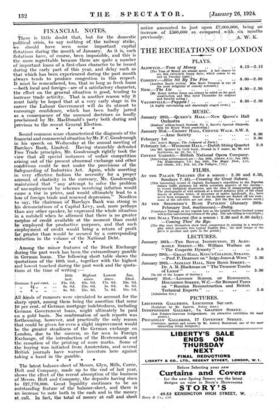FINANCIAL NOTES.
There is little doubt that, but for the domestic political crisis, to- say nothing of the railway strike, we should have seen some important capital flotations during the month of January. As it is, such flotations have, of course, been impossible, and this is the more regrettable because there are quite a number of important loans of a first-class character to be issued during the early part of this year, and delay such as that which has been experienced during the past month always tends to produce congestion in this respect. It must be remembered, too, that so long as fresh loans -both local and foreign-are of a satisfactory character, the effect on the general situation is good, tending to increase trade activity. That is another reason why it most fairly be hoped that at a very early stage in its career the Labour Government will do its utmost to encourage confidence, which has been badly jarred as a consequence of the unsound doctrines so loudly proclaimed by Mr. MacDonald's party both during and previous to the recent General Election. * * Sound common sense characterized the diagnosis of the financial and commercial situation byMr. F. C. Goodenough in his speech on Wednesday at the annual meeting of Barclays Bank, Limited. Having staunchly defended Free Trade principles, Mr. Goodenough rightly took the view that all special instances of unfair competition arising out of the present abnormal exchange and other conditions could be met under the provisions of the Safeguarding of Industries Act. Again, while asserting in very effective fashion the necessity for a proper amount of elasticity in the currency, Mr. Goodenough maintained that " any attempt .to solve the problem of unemployment by schemes involving inflation would cause a rise in prices, and would ultimately lead to a loss of foreign trade and renewed depression." Needless to say,- the Chairraan 'of Barclays Batik was strong in his denunciations of a Capital Levy, and, more perhaps than any other speaker, he expressed the whole situation in a nutshell when he affirmed that there is no greater surplus of credit available at the moment than could be employed for productive purposes, and that such employment of credit would bring a return of profit far greater than would be secured by a corresponding reduction in the volume of the National Debt.
* Among the minor features of the Stock Exchange during the past week has been the extraordinary gamble in' German loans. The following short table shows the quotations of the 10th inst., together with the highest .and lowest touched during the past week and the quota- tions at the time of writing :- 10th Highest Lowest Jan.
inst. since. since. 22nd.
German 3 per cent. .. 21s. Od. 45s. Od. 178. 6d. 24e. Od.
„ 3} „ „ 6s. Od. 25s. Od. 5s. Od. 8s. 6d.
„ 4 „ „ 8s. 9d. 258. 6d. 7s. 6d. 10s. Od.
U:kinds of rumours were circulated to account, for the Sharp spUrt, among them being the assertion that some 10 per cent. of German mortgage indebtedness, including German Government loans, might ultimately be paid on a gold basis. No confirmation of such reports was forthcoming, however, and practically the only reason that could be given for even a slight improvement would be the greater steadiness of the German exchange on London, due to the success, so far seen in Foreign Exchange, of the introduction of the Rentenmark and the. cessation of the printing of more marks. Some of the' buying was initiated from Amsterdam, and several British journals have warned investors here against taking a hand in the gamble.
The latest .balance-sheet of Messrs. Glyn, Mills, Currie, Holt and Company, made up to the end of last year, shows the effect of the recent absorption of the business of Messrs. Holt and Company, the deposits having risen to £27,776,000. Great liquidity continues to be an Outstanding feature' of the balance-sheet, and there is an increase to note both in the cash and in the money Wean, in fact, the total of money at call and short notice amounted to just upon £7,000,000, being an increase of £500,000 as- compared_ with six months previously. A. W. K.


































 Previous page
Previous page